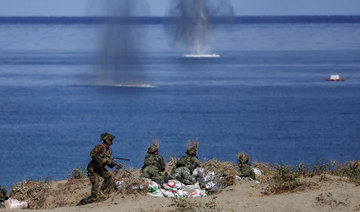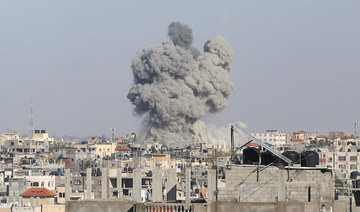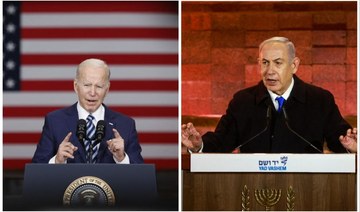TOKYO: Tokyo’s 2,848 COVID-19 infections on Tuesday were the Olympic host city’s highest since the pandemic began, officials said, as media reported that authorities had asked hospitals to prepare more beds for patients as the Delta variant drives the surge.
The rise in cases threatens to further erode support for Prime Minister Yoshihide Suga, whose ratings have slid to their lowest level since he took office last September, in large part because of his haphazard handling of the pandemic.
It also spells trouble for the Olympics, as many Japanese fear the influx of athletes and officials for the event could add to the surge. About 31 percent in a survey by the Nikkei daily on Monday said the Games should be canceled or postponed again.
“It’s the Delta variant,” said Kenji Shibuya, a former director of the Institute for Population Health at King’s College London, explaining the swift recent surge.
Shibuya added it was impossible to quantify to what extent the Olympics contributed to the surge but blamed the global sports showpiece as “one of the major driving forces.”
“The government has sent signals that people are supposed to stay home at the same time they celebrate the Games. It’s a totally inconsistent message,” said Shibuya, who is now running the vaccine roll-out in a town in northern Japan.
Japan has avoided the devastating outbreaks suffered by other nations such as India, Indonesia and the United States, but the fifth wave of the pandemic fueled by the Delta variant is piling pressure on Tokyo’s hospitals.
By Sunday, only 20.8 percent of the Japanese capital’s 12,635 COVID-19 patients had been able to obtain hospital treatment, government data showed. A government advisory panel says that if the ratio falls below the threshold of 25 percent, a state of emergency should be triggered.
In anticipation of the surge and considering the tough hospital situation, Tokyo has already declared a fourth state of emergency this month to run until after the Olympics.
In a last-minute change of heart, Japan also made the unprecedented decision to hold the Games, postponed from last year by the pandemic, without spectators to stem the spread of the virus.
As hospitals admit more patients, the city aims to boost the number of beds to 6,406 by early next month from 5,967 now, broadcaster TBS said.
Hospitals should look at pushing back planned surgery and scaling down other treatments, the broadcaster said, citing a notice to medical institutions from city authorities.
Health experts had warned that seasonal factors, increased mobility, and the spread of variants would lead to a rebound in COVID-19 cases this summer.
While vaccinations boost protection for the oldest citizens most likely to need emergency care, just 36 percent of the population has received at least one dose, a Reuters vaccination tracker shows.
The inoculation push has recently ebbed amid logistical snags after having picked up steam last month from a sluggish start.
Voter support for Suga slid nine points to 34 percent, its lowest since he took office last September, a July 23-25 Nikkei business daily survey showed on Monday.
Nearly two-thirds of respondents said the country’s rollout of coronavirus vaccinations was not going well.
Suga’s term as ruling Liberal Democratic Party (LDP) president expires in September and his LDP-led coalition faces an election for parliament’s powerful lower house, which must be held by November.
About a third in the Nikkei survey wanted the Games postponed again or canceled, while more than half said Japan’s border steps for incoming Olympics athletes and officials were “inappropriate.”
Despite tight quarantine rules for the Games, 155 cases have emerged involving athletes and others.
A strict “playbook” of rules to avoid contagion requires frequent virus testing, restricted movement and masks worn in most situations.
Olympic host Tokyo hits record 2,848 COVID-19 cases
Olympic host Tokyo hits record 2,848 COVID-19 cases
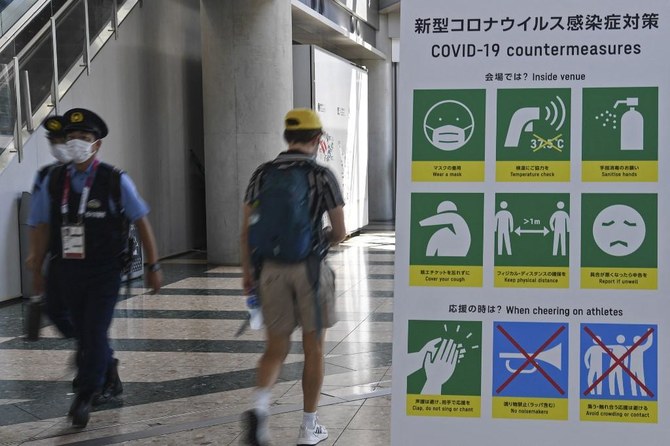
- The rise in cases threatens to further erode support for Prime Minister Yoshihide Suga
- It also spells trouble for the Olympics, as many Japanese fear the influx of athletes and officials for the event could add to the surge
Taiwan must invest in building its own ‘strengths,’ vice president-elect says
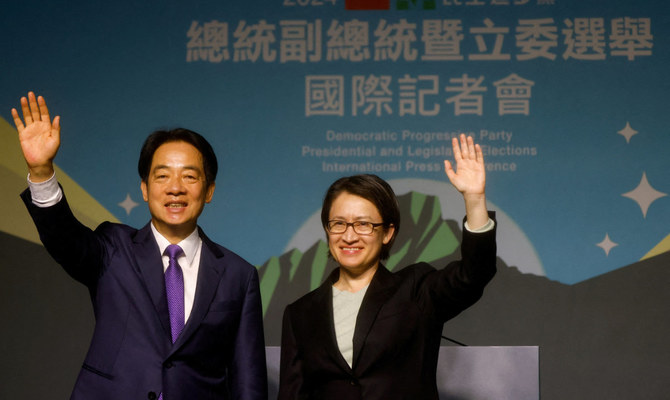
- The United States is Chinese-claimed Taiwan’s most important supporter and arms supplier, despite the lack of diplomatic ties
TAIPEI: Taiwan is grateful for continued US security assistance but must invest in building its own “strengths” first and show the world its support for the island is worth it, Vice President-elect Hsiao Bi-khim said on Monday.
Hsiao, who takes office with President-elect Lai Ching-te on May 20, is Taiwan’s former de facto ambassador to Washington, and is expected to play a key role in further strengthening ties with the United States given her fluent English and deep ties in the US capital.
The United States is Chinese-claimed Taiwan’s most important supporter and arms supplier, despite the lack of diplomatic ties.
Speaking to a think-tank forum, Hsiao expressed appreciation for US President Joe Biden last month signing into law legislation to boost Taiwan’s defenses, part of a broader package of assistance for Ukraine and Israel.
“This bill demonstrates the US’ continuing commitment to supporting allies and partners in the face of geopolitical challenges,” she said.
“But beyond thanking our international friends for their support, it is important that as Taiwanese we invest in building our own strengths first,” she said.
“Through our own efforts in building a resilient Taiwan, we must have the confidence that Taiwan is worthy of galvanizing international support.”
China has ramped up its military pressure against Taiwan over the past four years. Taiwan’s government rejects Beijing’s sovereignty claims.
Hsiao and Lai — who have pledged to continue President Tsai Ing-wen’s defense self-sufficiency and modernization program — take power just months before the US presidential election in November.
Former President Donald Trump, whose administration strongly supported Taiwan and is the presumptive Republican candidate this time round, has said US allies like European members of NATO have to spend more on defense and not just rely on the United States shouldering the burden.
Trump has also been critical of US support for Ukraine following its invasion by Russia.
Rafah invasion ‘must not go ahead’: UK Labour leader
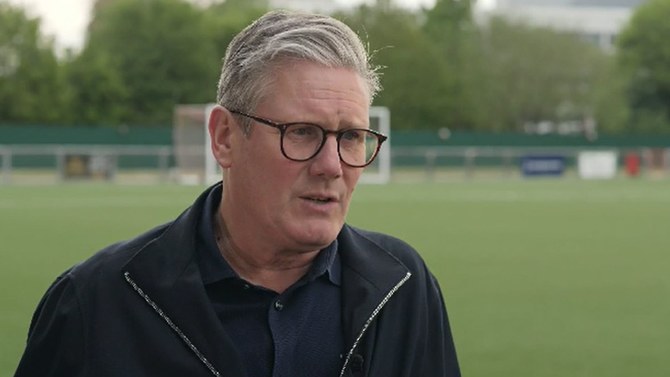
- Keir Starmer calls for ‘immediate ceasefire, release of hostages, unimpeded aid into Gaza’
- Israeli defense minister warns of ‘powerful operation in very near future’
LONDON: An Israeli offensive in the Gazan city of Rafah “must not go ahead,” the leader of the UK’s main opposition Labour Party said on Monday.
Keir Starmer’s comments came after the Israeli military told Palestinian civilians in the area to leave ahead of a planned offensive.
“With more than a million Palestinian civilians sheltering in Rafah, an Israeli offensive must not go ahead,” Starmer wrote on X.
“There must be an immediate ceasefire, the immediate release of all hostages, and unimpeded aid into Gaza that can be delivered regularly, quickly and safely.”
Israeli Defense Minister Yoav Gallant warned on Sunday of “a powerful operation in the very near future in Rafah.”
Starmer was echoed by his Shadow Foreign Secretary David Lammy, who posted on X that an invasion of Rafah “would be catastrophic.”
Shadow International Development Secretary Lisa Nandy warned that people trapped in Rafah “have nowhere else to go.”
So far, at least 34,700 Palestinians have been killed in Gaza since the start of the war last October.
India BJP’s election videos targeting Muslims and opposition spark outrage
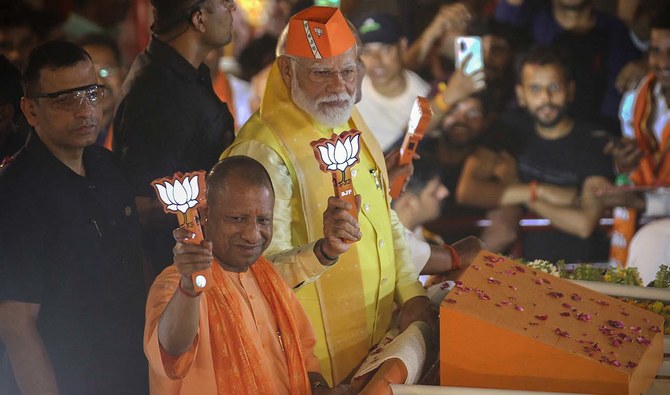
- Videos shared by BJP depict Congress giving disproportionate benefits to Muslims over tribal and Hindu groups
- Manipulated videos have become contentious issue in polls, such as fake videos of top Bollywood stars criticizing Modi
NEW DELHI, May 6 : Animated videos shared by Prime Minister Narendra Modi’s party targeting opposition Congress and the Muslim community have evoked complaints and outrage, as the political climate in India heats up midway through its six-week long election.
The videos, shared by the ruling Bharatiya Janata Party on social media platforms Instagram and X over the last ten days, depict the Congress giving disproportionate benefits to India’s minority Muslim community, at the cost of certain disadvantaged tribal and Hindu caste groups.
The Congress, in a complaint to the poll watchdog Election Commission, said on Sunday that the video has been shared “clearly with an intention to wantonly provocate rioting and promote enmity between different religions.”
A set of guidelines mutually adopted by political parties for how they should conduct themselves during the election period prohibit them from creating “mutual hatred” between caste, religious or linguistic groups.
Manipulated videos on social media have also become a contentious issue in this election, such as fake videos showing top Bollywood stars criticizing the prime minister.
On Monday, the commission warned parties against the misuse of AI tools to create deep fakes and told them not to publish and circulate such videos. It also said parties had been directed to remove such content within three hours of it being brought to their notice.
Modi, the face of the Hindu-nationalist BJP, seeking a rare third consecutive term, had focused his campaign largely on his government’s performance on economic growth and welfare benefits.
But he changed tack after the first phase of voting on April 19 and his campaign speeches have since become more polarizing on religious lines, accusing Congress of planning to redistribute the wealth of the majority Hindus among minority Muslims, who he called “infiltrators” who have “more children.”
The videos shared by the BJP over the last ten days, one of which has since been taken down, illustrated the same message.
A 17-second video shared by a state unit of BJP on May 4, with over 8.5 million views, shows a character resembling Congress leader Rahul Gandhi feeding “funds” to a bird in a skullcap, which eventually pushes out from their common nest three other birds representing other disadvantaged groups.
The Congress has filed a police complaint against BJP leaders for the video, BJP’s head of information and technology Amit Malviya said on X.
“The Congress should in fact thank the BJP for taking their manifesto to the people in a manner that even they couldn’t,” he wrote.
The video has elicited outrage. Nitasha Kaul, a politics professor at London’s Westminster University said on X that the video was a “straightforward 1930s Germany style cartoon.”
In its manifesto for the elections, the Congress has promised to tackle India’s economic inequality by conducting a socio-economic caste census and extending affirmative action. It said it will ensure that minorities receive “their fair share” of education, economic and health care opportunities.
An Election Commission spokesperson, the BJP’s Malviya and Congress spokespersons did not respond to requests seeking comment.
Bangladeshi students rally in solidarity with global student movement against Israel
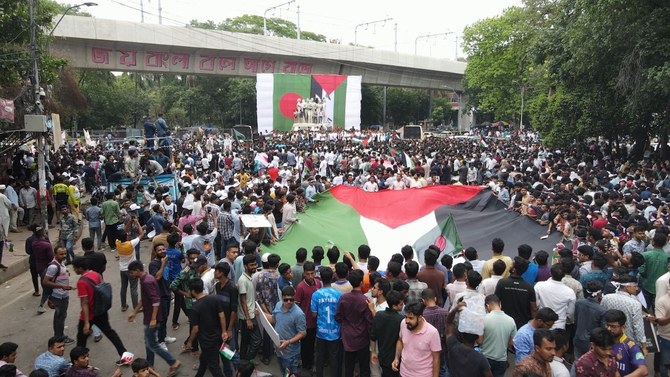
- US student protests have sparked more around the world, including in India, France, Australia
- Dhaka’s thousands-strong rally took place at Bangladesh’s largest, oldest tertiary institution
DHAKA: Thousands of people protesting Israel’s war on Gaza rallied at one of Bangladesh’s top universities on Monday in solidarity with the student-led protests and occupations sweeping the globe.
Pro-Palestinian student leaders and activists from different universities marched and carried flags of Bangladesh and Palestine, chanting slogans in solidarity with Gaza as they made their way to Dhaka University, Bangladesh’s largest and oldest tertiary institution.
Their protest culminated at the symbolic Aparajeyo Bangla sculpture, one of the most well-known landmarks dedicated to the Bangladesh Liberation War of 1971.
“Our stance is very clear: We express solidarity in support of a free Palestine state, in favor of a world free from war. And we support the demands made by US students, like divestment from Israel and other organizations that support the Israeli aggression,” Saddam Hussain, president of the organizing student group Bangladesh Students’ League, told Arab News.
They are also rallying in solidarity with the global student movement, he added.
“We believe all protests hold the same spirit of the youth, be it on the banks of the Atlantic or here on the bank of River Padma,” he said.
“The youths around the world have a common dream, and I urge all of them to move forward to make this dream come true. I hope all the youths of the world will join in this protest to build a world free from war, free and guided with humanitarian spirit.”
The Israeli strikes on Gaza that began in October have killed nearly 35,000 people in the Palestinian territory, mostly women and children. The leader of the World Food Program said over the weekend that parts of the Gaza strip were experiencing a “full-blown famine” that was spreading across the besieged enclave.
Students started to rally or set up tents at various universities around the US last month to protest Israel’s war on Gaza, sparking a global solidarity movement among the youth in India, Australia, France and elsewhere, with many putting pressure on their administrators and governments to cut ties with Tel Aviv.
While US colleges have seen protests since October, the unrest has escalated in recent weeks after police arrested pro-Palestine demonstrators at an encampment in Columbia University, sparking even more campsites at other campuses, as well as more crackdowns and arrests.
Unlike in the US, students in Dhaka were able to protest peacefully with scant police presence.
“The US and some other big players always speak in favor of freedom of speech. But what we have seen in the university campuses in the US is a shame for world leaders,” Solaiman Khan, a 23-year-old Dhaka University student, told Arab News.
“It’s a double standard. We, the youth (of Bangladesh), came out to the streets against this sort of hypocrisy from the superpowers of the world.”
Khan said the violence against Palestinians must be “stopped now and forever.”
“We have seen enough atrocities done by the Israeli forces. How many more lives must the world lose? Is it not enough?” he said.
“I think world leaders should come to their senses and act more rationally in stopping the atrocities in Gaza orchestrated by the occupying Israeli forces. Now is the time to play a decisive role. Otherwise, the next generation will not forgive us.”
Pro-Palestine Oxbridge students set up encampments

- They are demanding transparency about the universities’ financial links to Israel
- ‘We will not move until our demands are met’
LONDON: Students at the universities of Oxford and Cambridge have set up encampments in support of Palestine, The Times reported on Monday.
Around 50 have refused to leave the lawn of King’s College, Cambridge, while students have also declared a “liberated zone” outside Oxford’s Pitt Rivers Museum.
A banner hung outside King’s College read: “Welcome to the people’s university for Palestine.” Chants of “stop the bombing now” have also been heard on the campus.
The protests have been organized by Oxford Action for Palestine and Cambridge for Palestine.
They are demanding transparency about the universities’ financial links to Israel, which they have described as a “settler colonial state,” and are calling for the end of all investments and endowments from Israeli and Israel-linked companies.
“We have set up camp in university grounds, and we will not move until our demands are met,” the groups said in a statement, adding that the universities are legitimate targets for protests because of their “role in the British empire and its disastrous colonial legacies.”
The Times reported that protesters had been given an itinerary for their involvement including “de-escalation training” and “banner-making.”
A spokesperson for Cambridge University said it is for the college to decide whether to call the police, adding: “The university is fully committed to academic freedom and freedom of speech within the law and we acknowledge the right to protest.
“We ask everyone in our community to treat each other with understanding and empathy. Our priority is the safety of all staff and students.
“We will not tolerate antisemitism, Islamophobia and any other form of racial or religious hatred, or other unlawful activity.”
The relatively small UK protests come after nearly 2,000 people were arrested across the US after widespread demonstrations on over 130 American university campuses about Israel’s ongoing war in Gaza.



